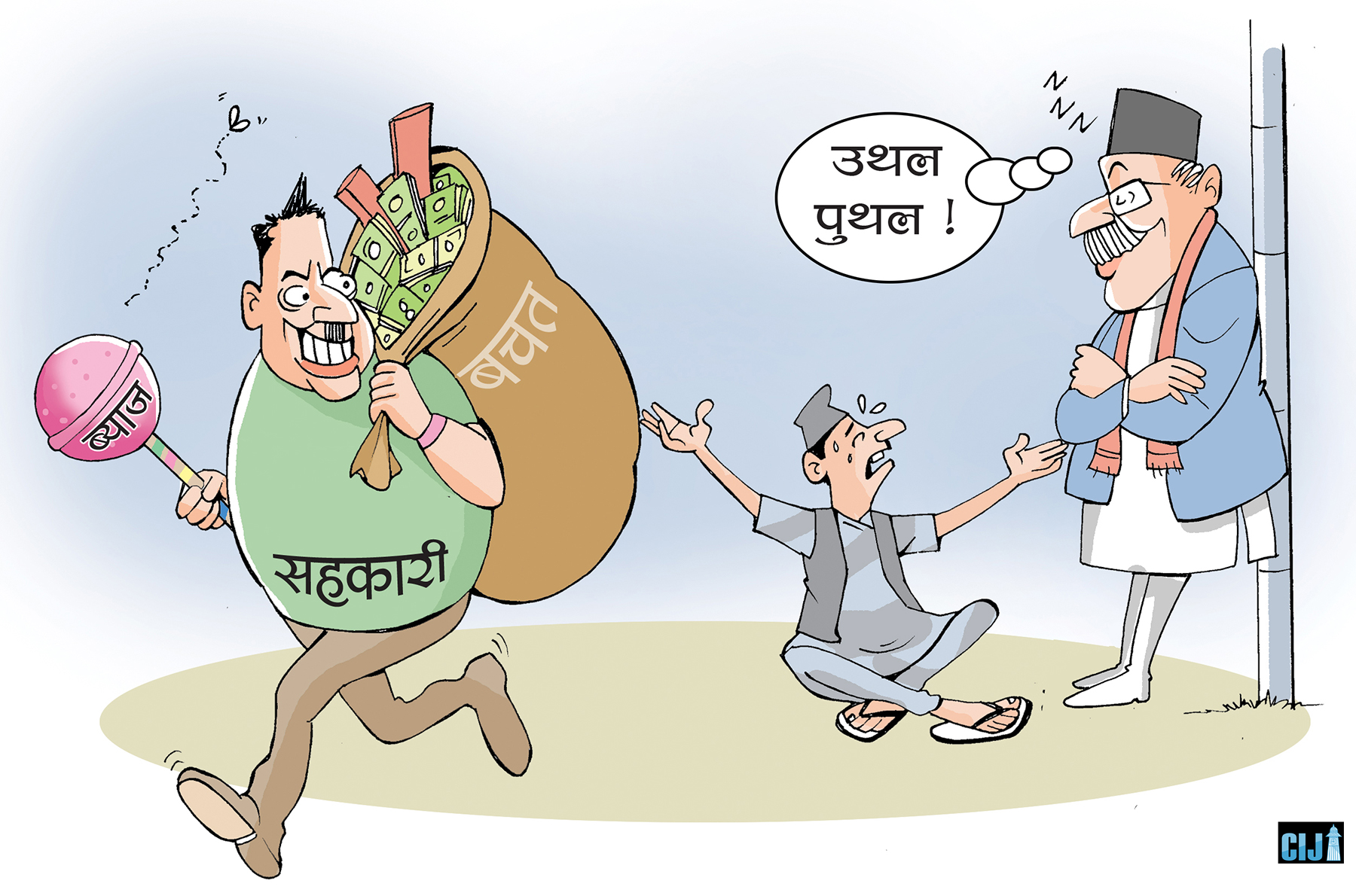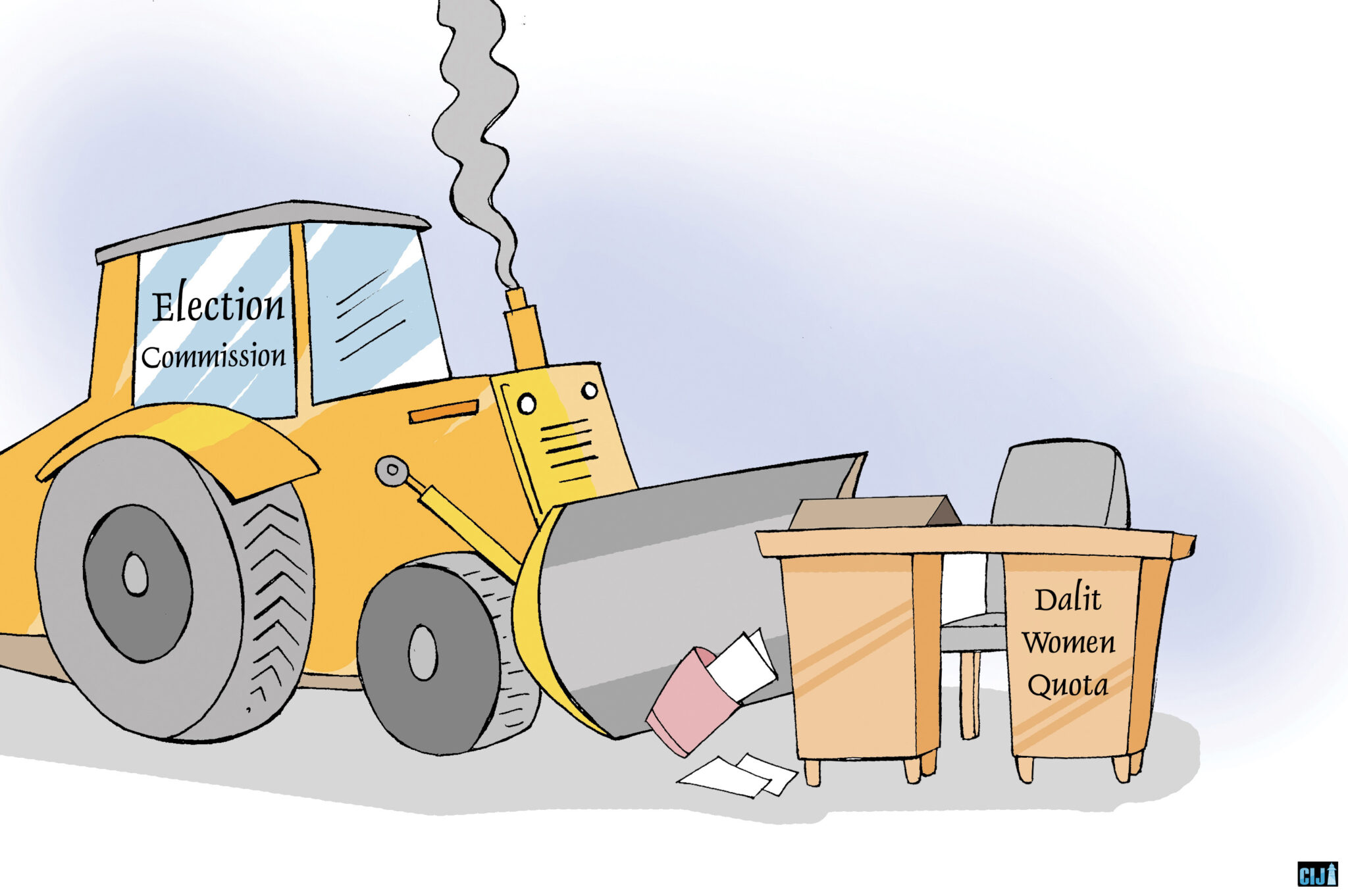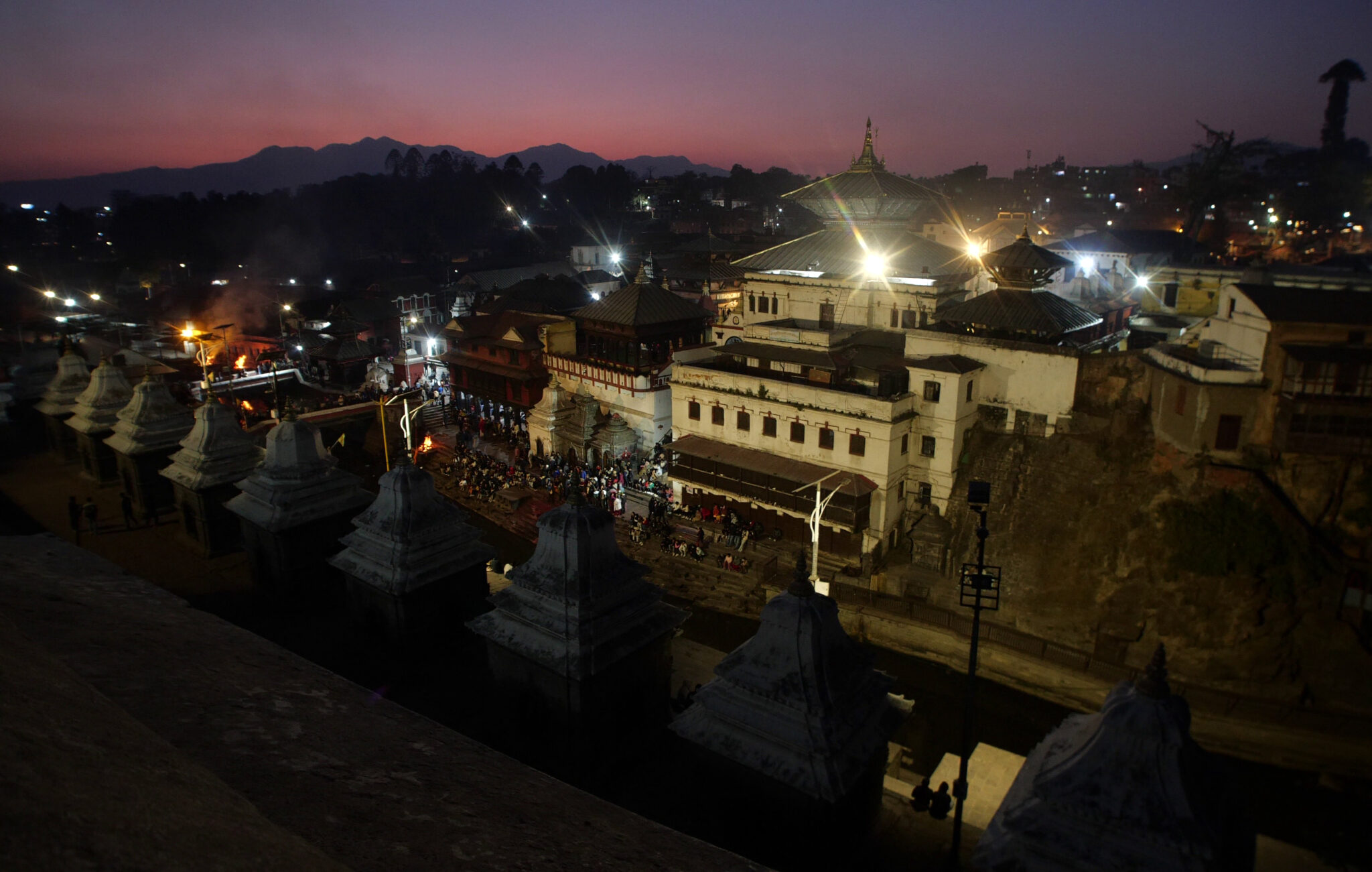The country is now in election mode. However, there are many settlements in Madhesh where even those who have reached the age of 70 have never cast their votes. Here we present examples of how government policies and practices deprive citizens of their right to vote, considered the greatest civil right in a democracy.
Mukesh Pokhrel |CIJ, Nepal
The local government elections are around the corner. Candidates in villages and towns are seeking votes from the public. Political parties have formed alliances to win the election, and voters are rooting for parties and candidates who understand their aspirations. Everyone has a choice in the matter of electing a government in their own hometown.
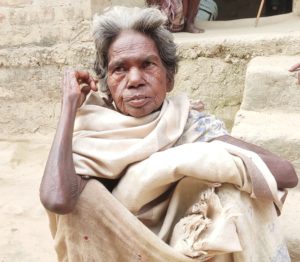
Khatri Sada (70) of Dhangadhimai Municipality-11 of Siraha has been unable to cast her vote so far. Photos by Mukesh Pokharel
However, 70-year-old Khatari Sada from Nainpur neighbourhood in Dhangadhimai Municipality-11, is an exception. She also wants to participate in the elections and see the representative of her choice win. Khatari, however, is not allowed to vote.
Khatari has never voted. How can those not allowed to vote be affected by election-related activities?
Five years ago, during the elections for the local governments and the House of Representatives, when she saw a neighbour of her own age go cast her vote, she too rushed to the polling station. However, she was returned saying that her name was not on the voters’ list. When the polls close, she gets upset when people talk of victory or defeat of candidates. “Are we inferior beings?” Khatari asks, “I don’t have many years left to live; I might die before I get to vote.”
Jhalo Sada (70) of Nainpur can’t walk properly. Even at her age, she has never voted, “Aren’t we humans?” She doesn’t care much at other times, but when the election comes, her heart burns. “Of course, no one returns to the voters after winning, but they come and meet you before the vote,” she said. Sometimes it feels like we’re not even human.”
Nepal’s constitution and election laws guarantee the right to vote for Nepali citizens who have reached the age of 18. A large number of senior citizens in Saptari, Siraha, Dhanusha, Rautahat and other districts of Madhesh Pradesh have been unable to exercise this right even once in their lifetime. The reason: Their names are not on the voter list.
For example, Rita Devi Sada (60) of Sakhuwanankarkatti Rural Municipality-2 of Siraha should have casted her vote in eight elections since the Panchayat period. Sada, who was eligible to vote in 1980, hasn’t cast her vote even once. The story of Manki Devi Sada (62) of the same village is not different from that of Rita Devi. Surya Sada (55) of Laxmipur, Surunga Municipality-3 of Saptari, has a similar story to tell, “It is interesting to see others voting. However, when we go to the polling station, we are told that our name is not on the voters’ list and we can’t vote.”
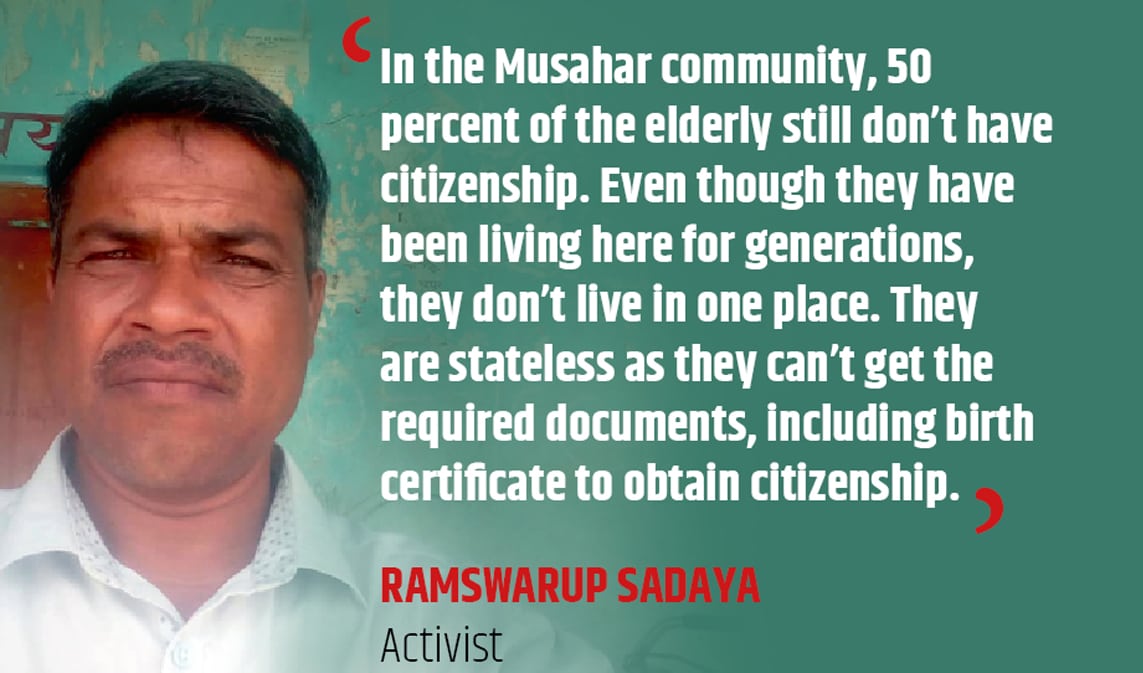
There is a significant number of Dalits, Mushars and Doms in the Tarai who do not exercise their voting right and complain that their votes have not been cast because they are Dalits. Jagiya Sada (65) of Nainpur, Dhangadhimai Municipality-11, Siraha, who has not been able to cast her vote even though she was eligible to vote in the 1970s, says, “Maybe it’s because we are Dalits, we aren’t allowed to vote?”
Eligible voters not allowed to vote
There are 30 Musahars living in Laxmipur in Saptari’s Surunga Municipality-3. According to settlement leader Urmila Sada, the number of people who have reached 18 years of age alone is more than 180. However, 35 people over the age of 25 have been unable to cast their votes so far.
The same situation was observed in the Dalit settlements of many districts of Madhesh Pradesh when we visited the area in the third and fourth week of last April. Asha Sadaya (60) and Zhovo Sadaya (55) of Dhangadhimai Municipality-11 of Siraha, Baluwatol have not cast their votes so far. Laxman Sadaya, a leader of the Musahar community, says that the names of 30 people over the age of 20 are not on the voters’ list.
Ram Narayan Sada, 44, of Musahari Tol in Bhujelia, Janakpur Sub-Metropolis-14 and his wife Jasodevi Sada, 40, have no voting experience so far. Garuda Municipality-6 of Rautahat, Tat Majhi (45) of Pothiyahi, Chhotelal Majhi (40) and Nathuni Majhi (37) have not cast their votes in any election so far.
Ram Narayan Sada (45) of Surunga Municipality-3 of Saptari and his wife Palah Sada (40) have grandchildren. However, the couple’s dream of casting their vote is still unfulfilled. “Whenever there is an election, they say our names are not on the list. How to vote?” said Palah. The stories of Tupasi Sada (35) and Phool Kumari Sada (28) of Surunga-3 are exactly the same.
In the Musahar settlements of Siraha, Saptari, Dhanusha and Rautahat we visited, an average of 25 out of every 100 people of voting age were found to be deprived of their voting right.
Citizens without citizenship
In a democratic system, suffrage is considered to be the greatest right of a citizen. Through the exercise of this right, the citizen chooses her representative, who makes key decisions on her behalf. Why are the major rights of the citizens in the districts of Madhesh Pradesh being frustrated like this? Why is the name of the eligible citizen not in the voter list? All these questions are related to the issue of citizenship.
All legal provisions have made a certificate of citizenship mandatory for a Nepali citizen to get enrolled in the voters’ list. The Voter Registration Act and related regulations, says that authorities may ask for the certificate of citizenship, land registration certificate, an identity card issued by government-owned institution or educational institution, recommendation letter from the village development committee or municipality, certificate of immigration, marriage registration certificate or other similar documents when registering a voter. It is mentioned that the name of the person who can’t show the required proof won’t be included in the voter list.
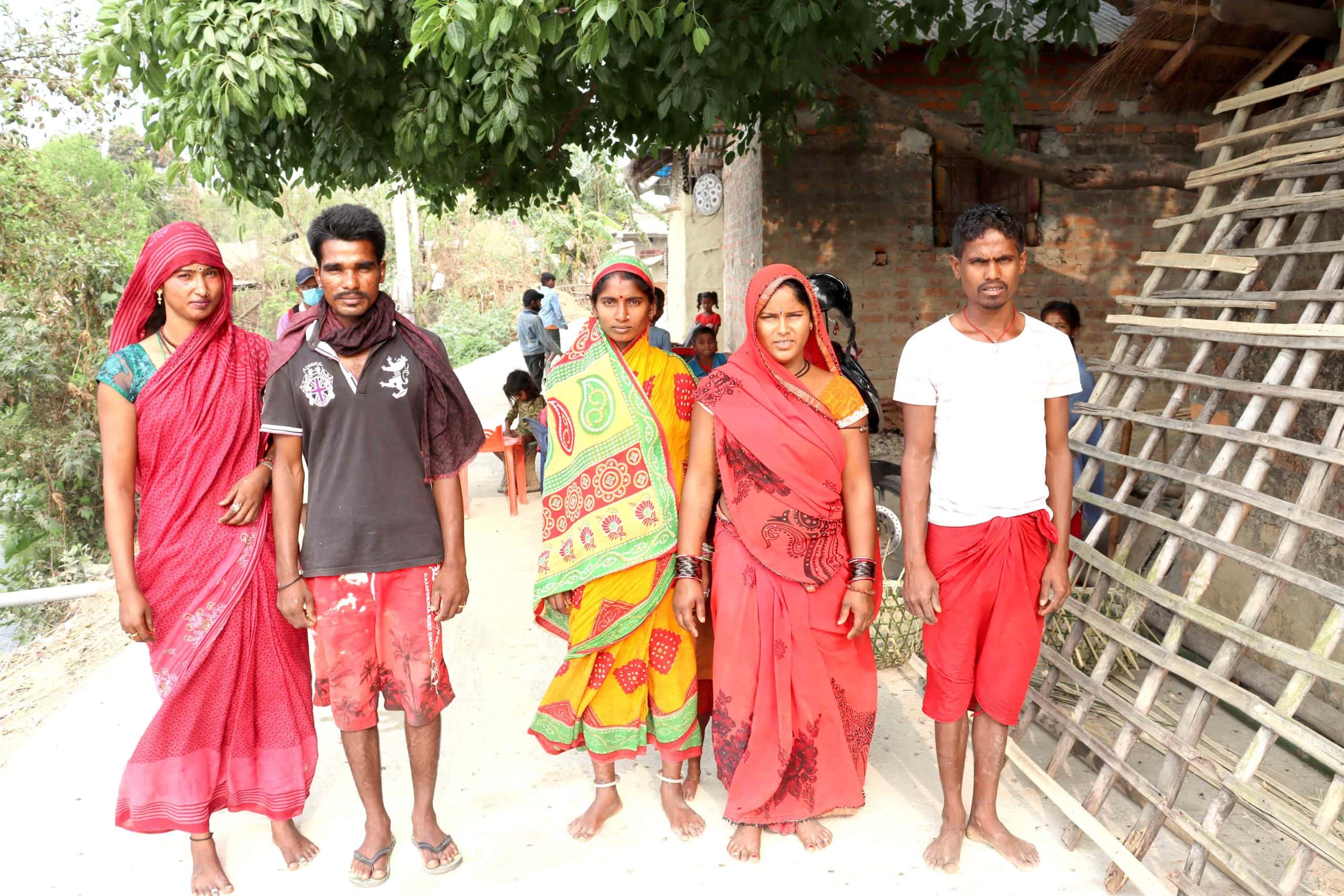
Residents of Lahan-11 are deprived of voting as their names are not in the voters’ list despite their citizenship.
The Constitution of Nepal also makes it compulsory for voters to possess citizenship certificates and reach 18 years of age to be included in the roll.
Before 2008, names could be included in the voter list on the basis of land ownership certificate, citizenship certificate, identity card issued by a government owned institution or educational institution, recommendation letter issued by village development committee or municipality, immigration certificate, marriage registration certificate or other such documents. After 2008, voter identity cards were introduced.
Due to their inability to show these documents along with the citizenship certificate, a large section of the Dalit communities in the Tarai are being deprived of the voting rights. Former Chief Election Commissioner Bhoj Raj Pokhrel said, “Many people may have been deprived of their right to vote due to non-fulfillment of the eligibility criteria for registration in the voters’ roll.”
Ramswarup Sadaya, who has been working to spread awareness in the Musahar community for nearly three decades, considers citizenship as the main issue related to voting rights. “In the Musahar community, 50 percent of the elderly are still stateless. There is no question of getting their names in the voters’ list due to lack of citizenship,” said Ramswarup. They are stateless due to lack of birth certificates and inability to obtain the required proof for citizenship.”
Jagiya Sada (65) of Dhangadhimai Municipality-11 of Siraha needs a citizenship certificate to receive her social security allowance. That’s why she went to the ward office to get a recommendation for citizenship. However, the representatives told her there wasn’t enough evidence to support her claim. Jagiya says, “Bring proof of citizenship from your father’s family. My parents have passed away, there is no birth certificate. Where do I get the evidence now?”

Two years ago, Soniya Sada and her husband Rajkumar Sada from Lahan Municipality-22, Siriaha visited the ward office to apply for citizenship. The ward secretary told them to first get their marriage registered.
But as citizenship certificates are required to register a marriage, they couldn’t do so. “I went to the ward office to apply for citizenship, but they told us to register our marriage first. But to do that we need citizen certificates,” says Soniya. “Where do we get the certificates that we don’t have?”
Saptari Chief District Officer Janardan Gautam says that a marriage can’t be registered without the citizenship of the husband. “The ward office will not proceed with the marriage registration process unless the husband and wife show up and present their citizenship certificates,” says Gautam. “We follow the prescribed procedures. There might be some who may not get citizenship.”
Another problem is that the ward office does not register marriages of persons above 60 years of age. According to Gautam, citizenship will be granted to them after the ward office certifies the marriage on the basis of the testimonies of villagers who have citizenship certificates.
However, in the Musahar community, Ramswarup shares, it’s not easy to find people to provide such testimonies. “Musahars are not literate, they are afraid to speak. If their work in a government office is not completed at one go, they don’t go there a second time,” says Ramswarup. Illiteracy among members of the Musahar community is another reason for this problem.“
Shiv Chandra Chaudhary, general secretary of the civil society Sarlahi, added, “Education and political consciousness are even weaker in the Musahar community where the economic situation is very weak.”
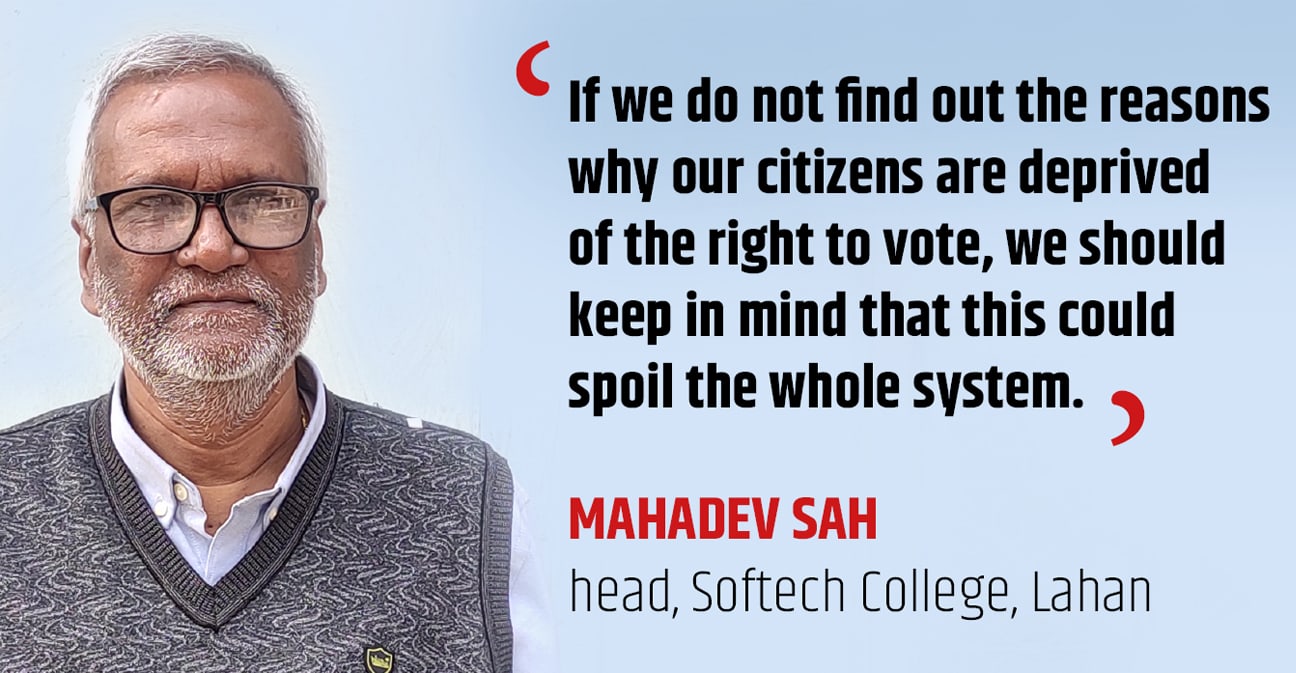
Doesn’t the so-called local government know about this situation? What is it doing when a large number of citizens are being deprived of the right to vote in every election? We asked this question to Kedar Yadav, chairman of Sakhuwanankarkatti village municipality of Siraha. Yadav said that even the elderly people were deprived of their citizenship as villagers weren’t ready to testify in front of officials. “In some places, we have testified ourselves to help issue citizenship certificates. But the problem persists in all Mushahar settlements.”
When we visited Musahar settlements, many told us that they were treated with contempt at government offices. Manju Sadaya of Dhangadhimai Municipality-11 of Siraha says that everyone from the ward office to the government office treat her with disdain. She says, “The poor and Dalits don’t count here. We are not treated like people in government offices. I don’t want to go through that.”
On top of that, government employees do not work without taking bribes. Pavita Sada of Dhangadhimai Municipality-11 complained that she had to pay Rs 3,000 to get a birth registration done. Prem Kumar Lama, chief of the registration branch of the municipality, claimed that the municipality doesn’t charge any fee for registration of personal incidents.
Surya Sada of Surunga Municipality-3, Saptari, says he had to pay Rs 1,000 to register a birth in his family. “It would cost Rs 5,000 rupees to get a recommendation for citizenship certificate from the ward office, I was told. But I couldn’t get citizenship because I didn’t have that much money,” he said.
The Musahar community has a large population in Saptari, Siraha, Dhanusha, Mahottari, Sarlahi, Rautahat, Bara and Parsa districts of Terai (Madhesh Pradesh). In the census of 2011, the population of Musahar was recorded to be 234,490. Sirahal alone was home to 39, 929. About 95 percent of the Mushahar population is landless. The literacy rate in this community is only 0.004 percent.

A significant number of citizens of the Dalit community in Madhesh have been deprived of citizenship and are unable to exercise their rights.
Ramswarup Sadaya, who works for the Musahar community, claims that the population of Musahars in the country is more than 900,000. “In our caste, it is customary to live with the in-laws after marriage. There is no permanent residence in one place,” he said. The census does not cover everyone.” He says that 25 percent of the eligible voters of the Musahar community are deprived of the right to vote.
Chairman of the Land Rights Forum, Siraha, Raj Kumar Paswan said that the obstruction in the exercise of the right to vote should be linked with the economic, social, educational and awareness situation. He said that the Musahar community was not aware of the need for citizenship and they were afraid to go to the government office as they would be treated as ‘untouchables’. As most of the Terai Dalits are landless, there is no question of a land ownership certificate. Due to that, they were deprived of the right to vote. “Yesterday, the parents did not apply for citizenship and now they can’t gather any evidence to support their claim,” he said.
In 2006, a campaign was launched to distribute citizenship to those deprived of citizenship. How did the Musahar community get deprived of citizenship even then? Shailesh Chaudhary, a leading intellectual living in Rajbiraj, Saptari, says that many people of this community were left out due to their compulsion to focus on daily wages. “Those who earn daily wages are the ones left out,” says Chaudhary.
Voting rights hijacked
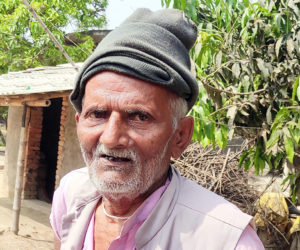
Dharikshan Sah
There is a large number of Dalits in Madhesh deprived of their right to vote. However, there are many villages where not only Dalits, but others are also not allowed to vote. The then Rajpur VDC (now Rajpur Municipality) under Rautahat Constituency No 2 was one such town where the residents could not cast their vote until a decade ago.
Dharikshan Sah of Rajpur is now 78. Sah, who had already reached the voting age in 1961, got to exercise his right to vote for the first time in his life nine years ago. The reason he was barred from voting was not related to his citizenship or the omission of his name on the voter list. “There was terror, there was killing. How can you go to the polls? ” Remembering the past, Sah said, “Others used to vote in our name.”
This is the constituency of Nepali Congress leader Mohammad Aftab Alam, who is serving a prison sentence for mass murder. Before him, this area belonged to his uncle Sheikh Idris.
On the eve of the first Constituent Assembly election, some people were killed in an explosion while making a bomb allegedly as per Alam’s instructions. Alam has been accused of burning the injured alive in a brick kiln.
During the second Constituent Assembly election, Alam’s nephew Mustaq Alam was chosen as a candidate from the then Madhesi Janadhikar Forum (Democratic). “After Raja Babu (locals call Mustaq Rajababu) was named the candidate, we were able to cast our vote. This was the first time we went to the polling station and cast our vote,” says Dharikshan. “Before that we were under Aftab’s rule, his men used to vote in our place.”
Like Dharikshan, Ram Bahadur Sah (72) and Parikshan Sah (70) also cast their votes for the first time nine years ago. “There was always terror during elections. Alam’s men used to cast their votes for everyone, no one was allowed to go to the polling station, ”says Ram Bahadur.“ We were afraid to even leave the house on election day. ”
It was the same election in which Alam suffered his first defeat.
UML candidate Shailendra Sah, who was defeated along with Alam in the first Constituent Assembly election, says that even deaths were not registered in Rajpur. “The situation has improved a bit since the voter list with photos came out, but the people were unable to cast their votes until they feared Alam ,” says Sah. “The people of Rajpur got to vote only after Alam’s nephew Mustaq contested the election.”
Parties don’t bother
Let’s return to the Dalit settlement. The story of the Dom community is similar to that of the Musahars. Dinesh Mallik (Dom) of Pidarwani, Lahan Municipality-11 of Siraha has turned 27. Although he became eligible to vote nine years ago, he will not cast his vote in this local elections. His name is not in the voters list.
The names of Mahesh Mallik, Umesh Dom, Rekha Dom and Poonam Dom of Pidarwani, who are all over 30, are also missing from the voter list. Explaining the reason for not being included in the voters’ list despite being a citizen, Mahesh said, “We are poor. We need to worry about earning a daily wage. So we don’t know when the voter list is updated.”
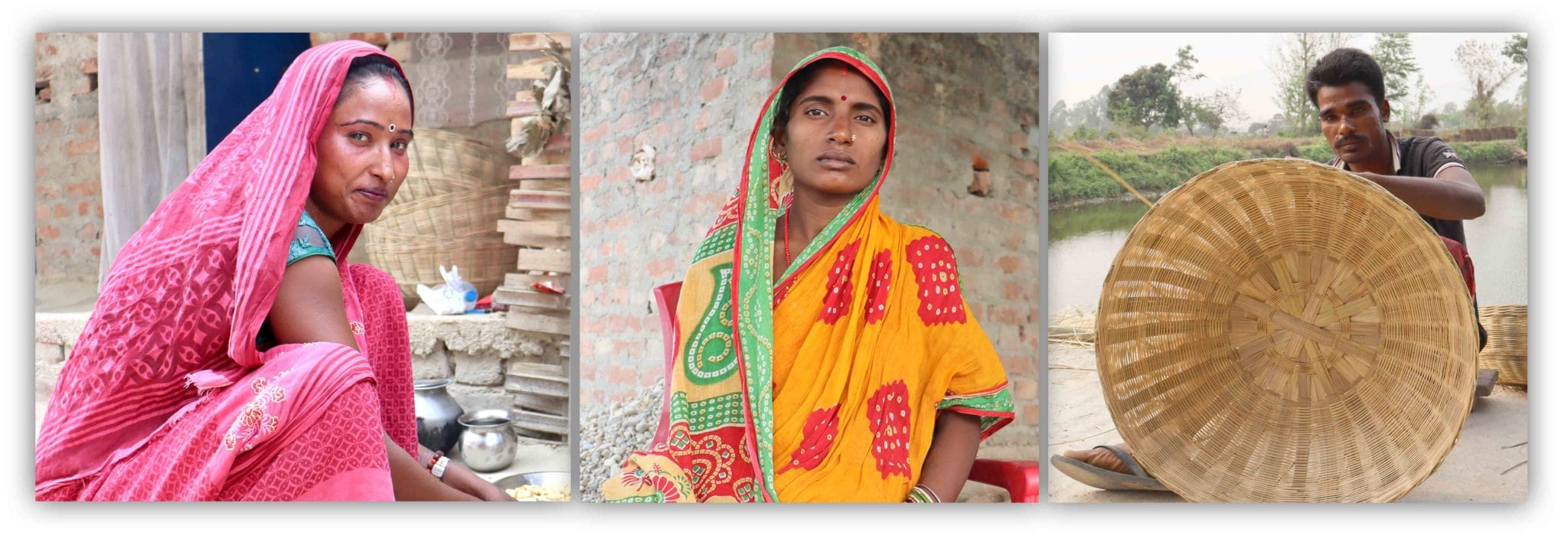
Poonam Dom, Rekha Dom and Dinesh Mallik from Pidarwani, Siraha
Loknath Prasad Yadav (45)of Garuda Municipality-6, Rautahat, Pothiyahi, has not cast his vote even though he has citizenship. He lamented that he has been unable to register his name as he is at work when the registration team arrives. Raju Sada (35) and Bina Sada (32) of Surunga Municipality-3 of Saptari are not included in the voters’ list despite having citizenship. They say, “After going to work in the morning, we return home at night. We do not know when the registration team comes.”
This situation is a matter of shame for political parties and their leaders. It is the responsibility of the Election Commission to motivate the citizens in the villages to get registered in the voters’ list. It is also the responsibility of the party leaders and cadres. However, the parties don’t seem to have taken any initiative in this regard.
Kedar Yadav, a member of the secretariat of the CPN (Unified Socialist) Siraha, and chairman of Sakhuwanankarkatti rural municipality, claims that the rural municipality had informed everyone during the voter list compilation. “We conveyed the news by holding a meeting of all the parties,” he said.
Ramswarup Sadaya, an activist of the Musahar community, says that the parties have not paid any attention to include the Musahar community in the voters’ list. “People in the party have a different point of view,” he said. “They believe that they can spend money and win elections. That’s why they don’t care about anything else. ”
Shiv Chandra Chaudhary, general secretary of civil society Sarlahi, says that the mindset of the parties that money can buy votes is mainly responsible for this. That is why the parties have turned a blind eye to the problems of the Dalit community, he said, adding that “Votes are captured by bribing the poor and deprived, even now.”
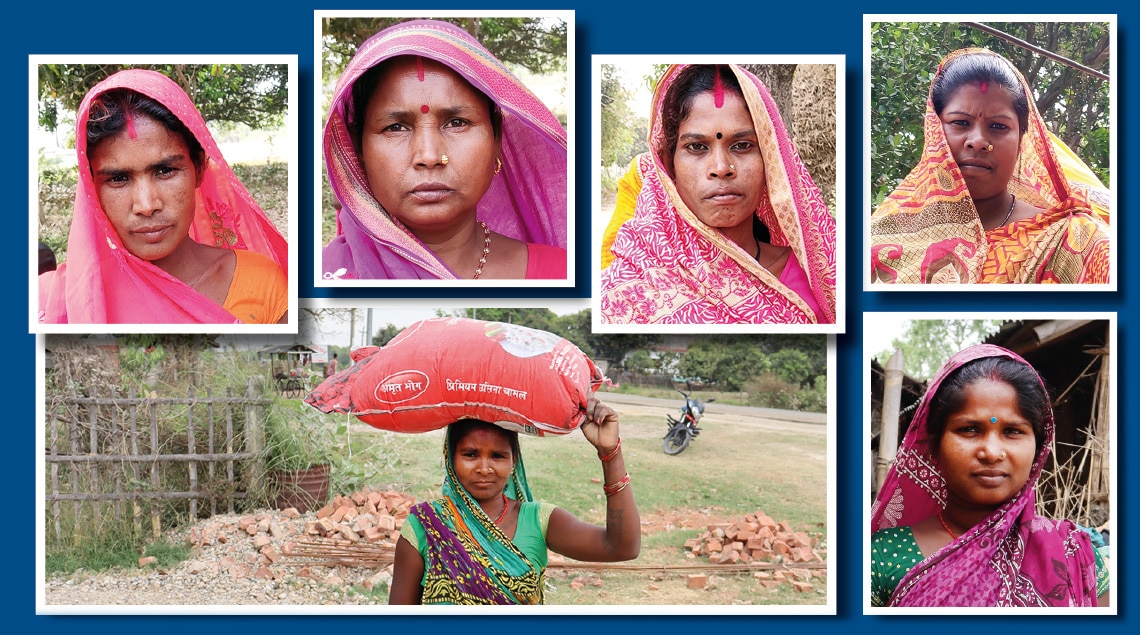
Nirmala Sada, Mankidevi Sada, Boliyadevi Sada, Kalasiya Sada, Plaha Sada And Soniya Sada.
Rani Sharma, a member of the Madhesh Provincial Assembly elected from Mahottari under a Democratic Socialist Party ticket, says that the vote buying and selling of the Dalit community has decreased. “It’s not like before,” she says. Dalit community members are also getting educated. The situation is improving. ”
More women deprived than men
In Nainpur and Baluwatol of Dhangadhimai Municipality-11 of Siraha, 42 out of 60 people not included in the voter list are women. They range in age from 25 to 70 years. Manju Sada, a leader from Nainpur, says women find it hard to get citizenship as officials demand proof of kinship from their parents.
For example, Iner Sada (44) of Nainpur, who went to the ward office to apply for citizenship, was asked to present the citizenship of her father, mother or brother. It was not possible for Sada, who is from Saptari’s Shambhunath Municipality-8, to do so. “My parents are no longer there. Where do I get evidence of their citizenship ?” she said.
Tupasi Sada of Saptari, Laxmipur, has also been deprived of citizenship as she could not present the citizenship of her parents. “My parents are not there, my brother lives abroad,” she said. “I will apply for citizenship again after my brother returns.”
Even though the constitution of Nepal does not deprive any Nepali from citizenship, the district administration offices are still distributing citizenship on the basis of Citizenship Act and the Citizenship Certificate Distribution Procedure Guideline. The procedure stipulates that in order to obtain citizenship by descent, a person has to complete 16 years of age and present the certificate of Nepali citizenship, place of birth of the father, mother or relatives of their descendants within three generations.
Women who are married without citizenship must present a marriage certificate, and the citizenship of her husband or father-in-law. They also need to present the citizenship of their mother, father or brother. Those who fail to present these proofs will not be granted citizenship.
Mira Dhungana, a women’s rights activist and advocate, says, “First, women get married without applying for citizenship. Second, even after getting married, they don’t apply as they think they don’t need it as they are not going to leave the house. ”
The book ‘Election’, published by the Election Commission, states that whatever the electoral system, it should ‘express the views of as many voters as possible’, ‘the general electorate must participate’ and ‘voters should have easy access’. However, even when such a large number of people are deprived of the right to vote, the commission doesn’t seem to have taken any initiative.
Former Chief Election Commissioner Bhoj Raj Pokhrel said that it was the responsibility of the state to find out the reasons behind the disenfranchisement of its citizens and include them in the polls. Pokharel says, “If the citizenship certificate is mandatory in the law, then the law should also be reviewed. Voters missing due to state policy should be addressed in a special way.”
Mahadev Sah, who teaches Political Science at Softech College, Lahan adds, “If we don’t find out the reasons why our citizens are deprived of their right to vote, we should keep in mind that this could spoil the whole system.”
‘How long do we wait for our right to vote?’
“Convey our problems to the leaders. When can I vote? I was born in Nepal and live here. Why are we despised because we are poor? How long do we wait to vote? ”
-Manikadevi Sada
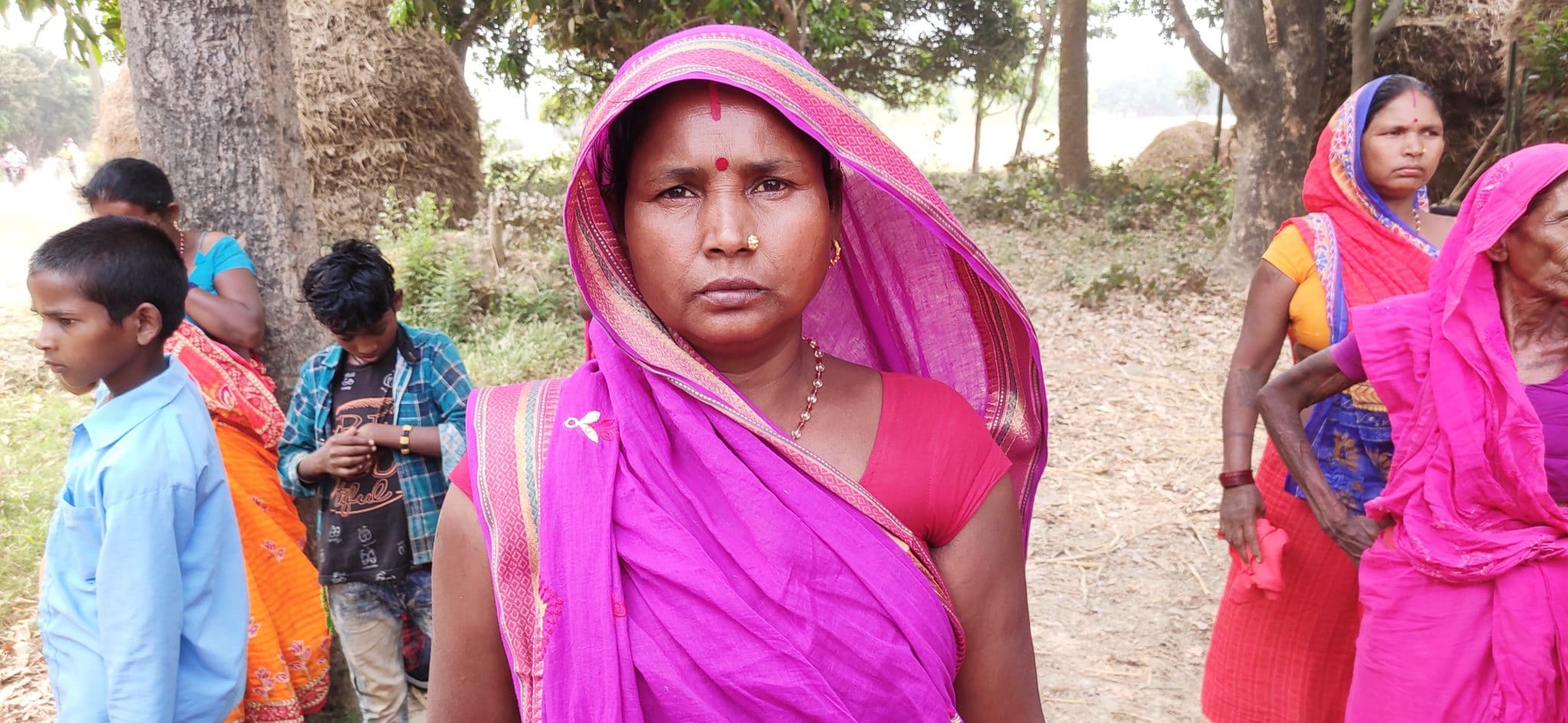
I am 62 years old. The village is in an election mood now. After the announcement of elections, the situation in the countryside changes. Leaders begin asking for votes. However, I find it unpleasant. The reason is that I have not been able to vote yet. I don’t even know how to vote. My name is not on the voter list. I sometimes hope that elections don’t take place at all. The happiness of those who get to vote is different.
My husband votes. I also asked my husband to get my name registered many times. But as I don’t have citizenship, I can’t vote. He has his citizenship, I don’t.
I was born in Nepal, got married and came to this house. Why didn’t I become a citizen? No one in my family, nor the in-laws cared. They say I can’t vote because I don’t have citizenship. But I don’t know why my citizenship was not granted. And why I didn’t get to vote, I don’t know myself.
Now I have only one wish, to die only after voting. Having been unable to vote for so many years, I wonder if it will ever be possible to do so now. There are many women like me in our village. It is because we don’t have citizenship. Some even have citizenship, but for some reason they have been unable to vote.
Sometimes I feel that it’s because I was born a Mushar woman that I was deprived of my right to vote. I see many other Musahar deprived of their rights, and I console myself. Even if my name is not on the list, I go to the polling station on election day. From a distance, I look at others voting, and I return. Even though I have been unable to cast my vote so far, I ask other sisters who have cast their votes, how they do it.
In our society, Musahars are treated with contempt. We are treated as untouchables. We are not allowed to fetch water from wells and streams. If my name were on the list, I would have asked the people who come to seek votes why our neighbourhood is not developed and when the children of Musahar can go to school. But, my name is not there and no one listens to us. They don’t even look for those whose names aren’t on the list.
But when they organise processions or programmes, they look for us. The leaders should have gotten us enrolled in the voter list! They also need votes. But they don’t. They had come to the village to attend a procession a few days ago. Everytime they say they will get us enrolled next time. That is why I have come to this programme today.
It is fun to attend party programmes like this. But, what to do? There is also hope that our name may be included in the list in the future.
When you asked us about how to vote, why we are here, I thought that you were here to enrol us in the list.
Please convey our problems to the leaders. When can I vote? I was born in Nepal and live here. My mother is also here, my house is also here but why am I being despised for being poor? How long do we go on without voting?
(Based on a conversation between journalist Mukesh Pokhrel and Sada, 62, of Sakhuwanankarkatti Rural Municipality-2, Siraha, who was participating in an election rally organised by CPN-Unified Socialist.)

